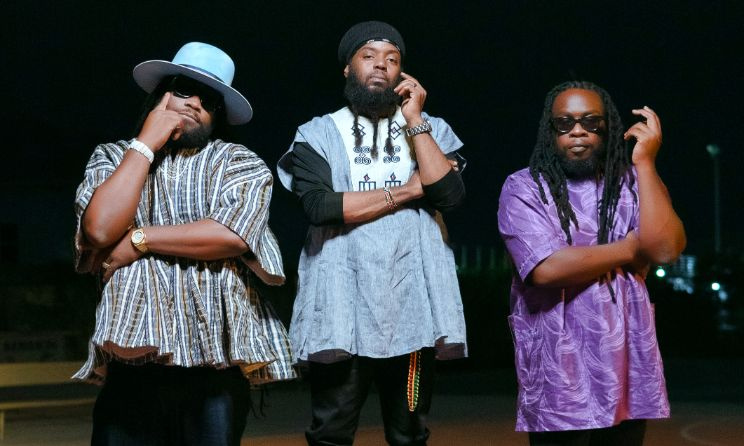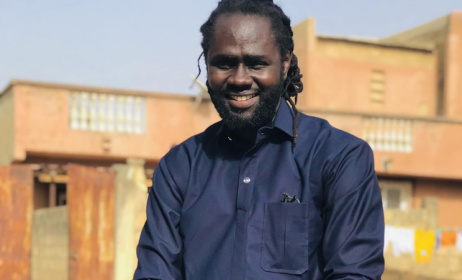Morgan Heritage’s Mr Mojo talks about Afro-fusion and reggae’s global expansion
Renowned Grammy-winning Jamaican band Morgan Heritage’s sound is underlined by reggae – but it also boasts a unique approach that blends the best of reggae with unexpected musical influences, from rock to rap.
 Morgan Heritage: Roy ‘Gramps’ Morgan, Peter ‘Peetah’ Morgan and Memmalatel ‘Mr Mojo’ Morgan.
Morgan Heritage: Roy ‘Gramps’ Morgan, Peter ‘Peetah’ Morgan and Memmalatel ‘Mr Mojo’ Morgan.
These days, trips to Ghana and tours around Africa have become habitual for the group, which is keen on bridging cultures. Recently, on one such visit, Memmalatel ‘Mr Mojo’ Morgan, one-third of the trio, tells me that the latest chapter of the band’s evolution is a return to Africa, and the band’s forthcoming album The Homeland is positioned as a beautiful fusion of African and Jamaican sounds.
Mr Mojo plays in Morgan Heritage alongside his brothers Peter ‘Peetah’ Morgan and Roy ‘Gramps’ Morgan, all children of the late reggae legend Denroy Morgan. The band was formed in 1994 by the three and now past members Una Morgan and Nakhamyah ‘Lukes’ Morgan.
When I meet Mr Mojo in Accra, a black baseball cap sits loosely on his dreadlocks, which reach down to his folded arms. He also sports dark shades, a summer shirt, faded blue jeans and black leather boots – a royal soldier who is also in touch with urban swagger. His diction, deliberate and kindly, tosses between an American accent that betrays his Springfield, Massachusetts birthplace, and the Caribbean elocution honouring his roots.
On this occasion, Mr Mojo is here to prepare the grounds for the release of ‘Who Deh Like You’ featuring regular Ghanaian collaborator Stonebwoy as well as fellow Jamaican acts Bounty Killer and Baby Cham. The record, a dance-ready love song that celebrates authenticity, debuted at No 1 on the US iTunes Afrobeats Chart upon its release. Mr Mojo’s Ghana itinerary also includes filming music videos with different artists featured on the upcoming album.
Due to be released in April, The Homeland will be the group’s first album since Denroy Morgan’s passing last year. Splattered with a glamorous guestlist that includes Popcaan, Youssou N'Dour, Shaggy, Beenie Man, Shatta Wale, Made Kuti and more, the album represents a rebirth for the Morgan brothers, who aim to expand their music to a global audience beyond the Caribbean and African, taking listeners on a journey that reflects the past and the future.
“We’ve always been influenced by other genres of music,” Mr Mojo, who tags The Homeland as ‘Afro-fusion’, tells me, before reiterating the growing notion that genres will disappear and be replaced by a focus on the overall feeling or atmosphere of songs.
As much as reggae was a fixture in the Morgan household, Mr Mojo confesses to growing up to top-40 radio – listening to the great pop, rock and R&B artists of the day. “Our parents made sure we were good musical students, but the reggae sound was always present. In Jamaica, historically, we always loved American music and we loved to do covers. So the influence of other genres is not new to Jamaican music or African music. It’s beautiful that something like Afro-fusion exists that we now fit into.”
Often, when listening to Morgan Heritage’s music, one might assume it is solely reggae due to the band’s association with the genre, but the elements go everywhere. The reason, Mr Mojo submits, is that they don’t “always sing in a Jamaican accent”, before proceeding to rap a few lines from their song ‘Just a Number’. “I’m rapping,” he chuckles. “I’m the rapper in Morgan Heritage.” To do that on African rhythms, therefore, would not be new to him.
As reggae has long become a global phenomenon, I want to know Mr Mojo’s assessment of the various interpretations from other parts of the world. “We love it,” he grins proudly. “And we incorporated that heavily on the album by making sure the reggae songs of this new album have the sounds of Africa fused with it. That potpourri is what the blueprint is for the album: to bring in people from different countries across the continent and link them with featured artists from Jamaica.”
When I quip that it’s a politically correct answer and that it must be awkward when they meet reggae artists from around the world at the Grammys, Mojo’s answer remains the same: reggae is reggae regardless of where it’s coming from, be it Ghana, South Africa or Senegal.
“Isn’t hip hop hip hop?” he asks rhetorically. Judging by the added seriousness of his speech, I can tell that this is a topic he is very passionate about. He continues: “I just want to make people understand that. Let’s stop trying to put music in a box. If you create classical music, there is nothing like ‘Italian classical music’. Because my son is a trained classical guitarist. He went to college. He’s not an American classical musician. He is a classical musician from America. Wherever you are from the world, we expect you to infuse your culture and traditional sound from that place into your brand or style of music. It’s sort of like the California reggae scene, with artists like Rebelution, Slightly Stoopid and Soja.”
Mr Mojo can appreciate the sentiments of the purists who say that reggae “must come” from Jamaica. “We feel a sense of ownership and we should,” he stresses. “That’s a sense of pride.” At the same time, he believes that it is not feasible to restrict the expansion of reggae to its Jamaica boundaries. The continuous growth of R&B and hip hop, he observes, is due to their global adoption by individuals worldwide. The same phenomenon is happening with African music as it gains more popularity and recognition.
“You’ll see pop artists collaborating with African artists like Selena Gomez and Rema. Growth is inevitable. Change is inevitable, and if you’re an innovator, as we are, you’re going to embrace the change. And that’s all we’re doing. Embracing the change.”
As someone who has been at the forefront of Jamaican music for many years, Mr Mojo believes that the current popularity of Afrobeats is simply due to people looking for an escape from the realities of life. “Reggae music has always been a way to escape and relax, and now Afrobeats is serving that purpose for people all over the world,” he says but disagrees with my opinion that it took the world long to embrace Afrobeats. “It just took time for the sound to be defined,” he explains, adding that African music has had its own trajectory and that “it was always going to evolve to where it is now. We’ve been on this journey for a while, as can be heard on our record Hallelujah with Diamond Platnumz from six or seven years ago.”
On the importance of African representation on a Morgan Heritage album, it’s all about unity within the music. African artists often have limited slots for mainstream radio airplay, so when “we can achieve representation and success, it’s a great thing.”
On what Afrobeats can learn from reggae, Mr Mojo cites creativity and the West African genre’s willingness to not be sonically stagnant. Reggae music can become monotonous with its one rhythm, but creativity and diversity in delivery keep it fresh and exciting. As long as artists continue to do that with Afrobeats, it will have sustained success, he notes.
As for what has sustained the Morgan Heritage brand over the years, Mr Mojo says it’s simply paying attention to what’s going on in the world and evolving with it.
“We make sure that our music can connect with different generations as they grow and change. We always strive to put our best foot forward musically and make sure that we are connected with different generations as they come up. In the end, we want to make music that will stand the test of time and be remembered for years to come,” Mr Mojo says.



























Commentaires
s'identifier or register to post comments